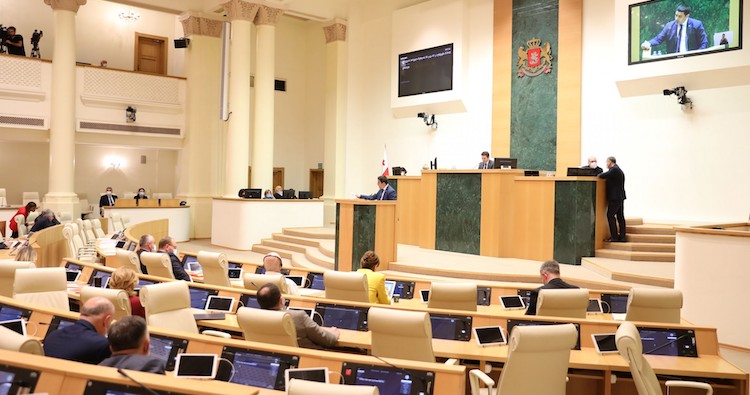Parliament adopts electoral amendments, two opposition factions refuse to vote

The electoral reform legislative package contains twenty significant reform points and five of them are provided in the April 19 agreement. Photo: Parliament of Georgia press office.
The Georgian parliament has adopted electoral amendments with its third and final reading which were initially proposed back in March 2021 by the ruling Georgian Dream party and Citizens opposition and later were revised in line with the April 19 EU-mediated agreement.
The amendments which push major changes to the country’s electoral system were voted for by 86 MPs in the 150-member parliament.
Two major opposition factions in parliament, the United National Movement (UNM) and Lelo – Partnership for Georgia have refused to vote for the amendments ‘because they do not fully reflect the EU-mediated agreement.’
The electoral legislation reform package provides changes to the structure and effectiveness of the supreme body of the Election Administration of Georgia, the Central Election Commission (CEC):
- The membership in the CEC will increase from 11 to 17 members, all three levels of the CEC will be staffed with seven professional and nine party-appointed members.
- Obstruction of voters’ movement in the polling stations or within 100 meters will be forbidden
- Electronic technologies, 10% of random detection of electoral districts and the principles of their recalculation will be introduced
- Clear criteria for a mandatory recount of electoral districts are defined in the amendments
- A CEC advisory group will be set up to monitor disputes and recounts.
Per the amendments CEC chairperson will be elected only by the parliament of Georgia with the nomination of the president of Georgia and not by the CEC itself. The Deputy Chairman of CEC will be elected from among the members appointed by the non-majority parties.
 Ruling Georgian Dream party MP Shalva Papuashvili and member of Citizens MP Levan Ioseliani prepared the document on amendments to the electoral code. Photo: Parliament of Georgia press office.
Ruling Georgian Dream party MP Shalva Papuashvili and member of Citizens MP Levan Ioseliani prepared the document on amendments to the electoral code. Photo: Parliament of Georgia press office.
Eventually, we adopted the package of fundamental reforms in six different areas concerning the electoral system, electoral administration, pre-election campaign, voting procedure, counting procedures and election disputes”, ruling party MP Shalva Papuashvili said.
The electoral reform legislative package contains twenty significant reform points and five of them are provided in the April 19 agreement.
This precedent was set by us, the Citizens' party, together with the Georgian Dream, and I believe that the opposition should cooperate with the ruling party on such issues, which in its meaning are not party-related”, said Citizens MP Levan Ioseliani.
For the purpose of correcting the shortcomings in the electoral legislation, the reform process started in June 2019, reflecting the recommendations of the OSCE Office for Democratic Institutions and Human Rights (ODIHR).
A joint assessment of Transparency International Georgia (TI) and International Society for Fair Elections And Democracy (ISFED) on the electoral reform process said:
Although the working group formation process was more or less inclusive and transparent, no agreement was reached on fundamental issues such as reviewing the rules for forming the election administration, regulating social media campaigning, and resolving election disputes,” reported in the document.
The bill passed by the parliament will be sent to the president for signature and after that will come into force.
- The EU-mediated agreement proposed by European Council President Charles Michel back in April 2021 helped Georgian political parties resolve a six-month political crisis.
- Georgian opposition parties took to the street following the October 2020 parliamentary elections and demanded the conduct of repeat elections.
- They claimed that the ruling party fabricated the elections.
- The EU-mediated agreement which was signed by the majority of Georgian political parties proposed large scale electoral and judicial reforms.
- Prior to signing the agreement, two opposition parties, including Citizens with two MPs entered the state legislature because the leaders of the party managed to agree on electoral reform with the ruling party.
 Tweet
Tweet  Share
Share